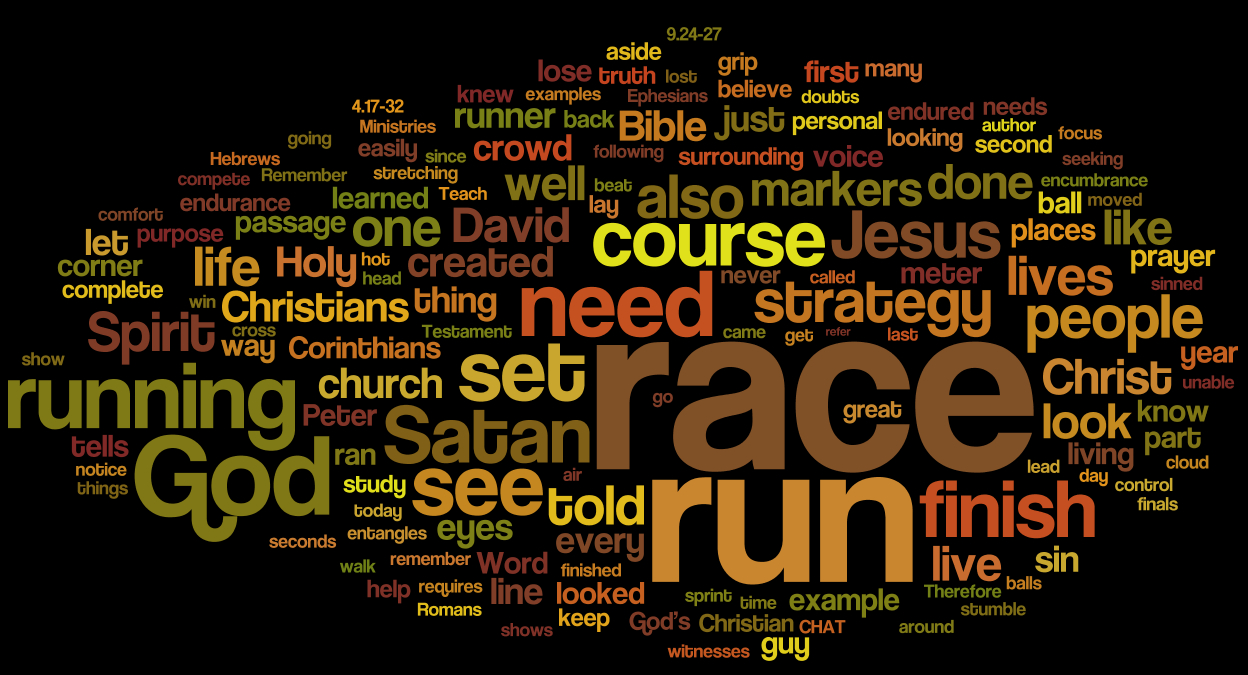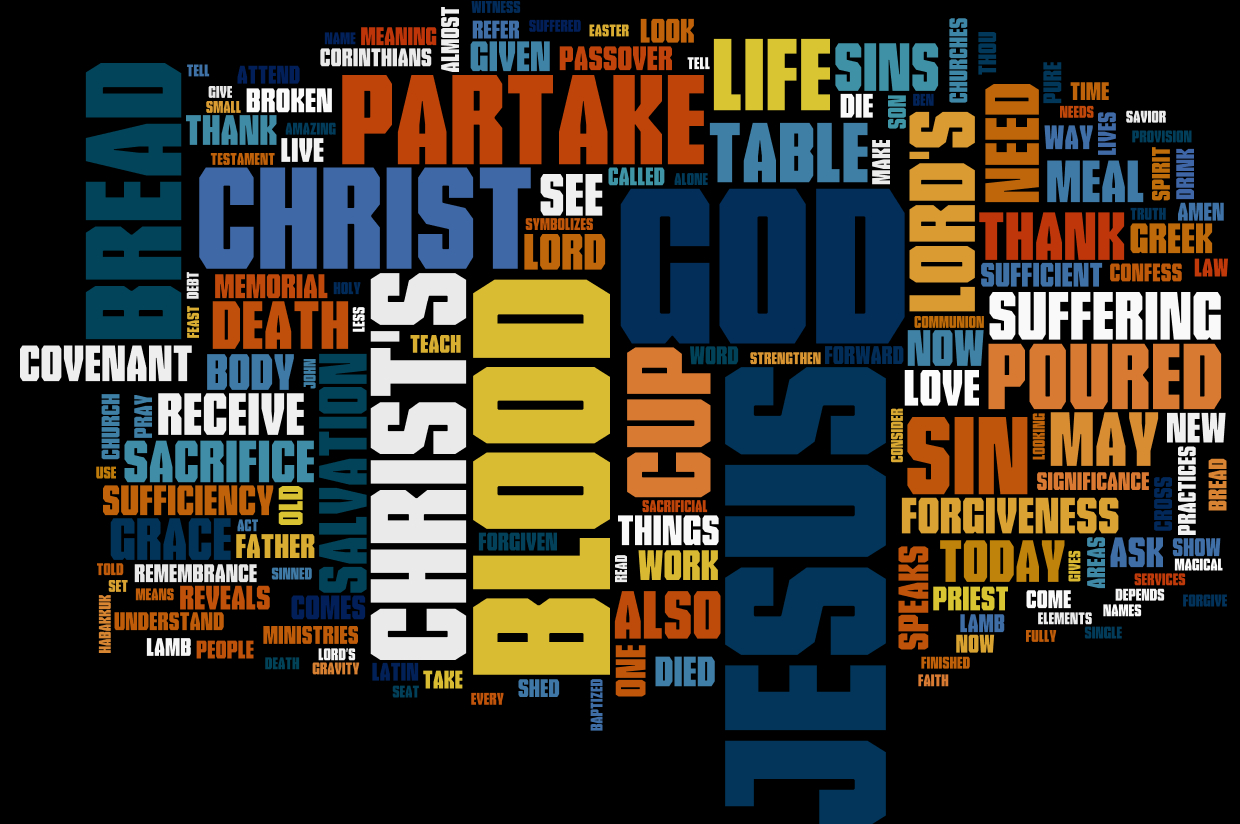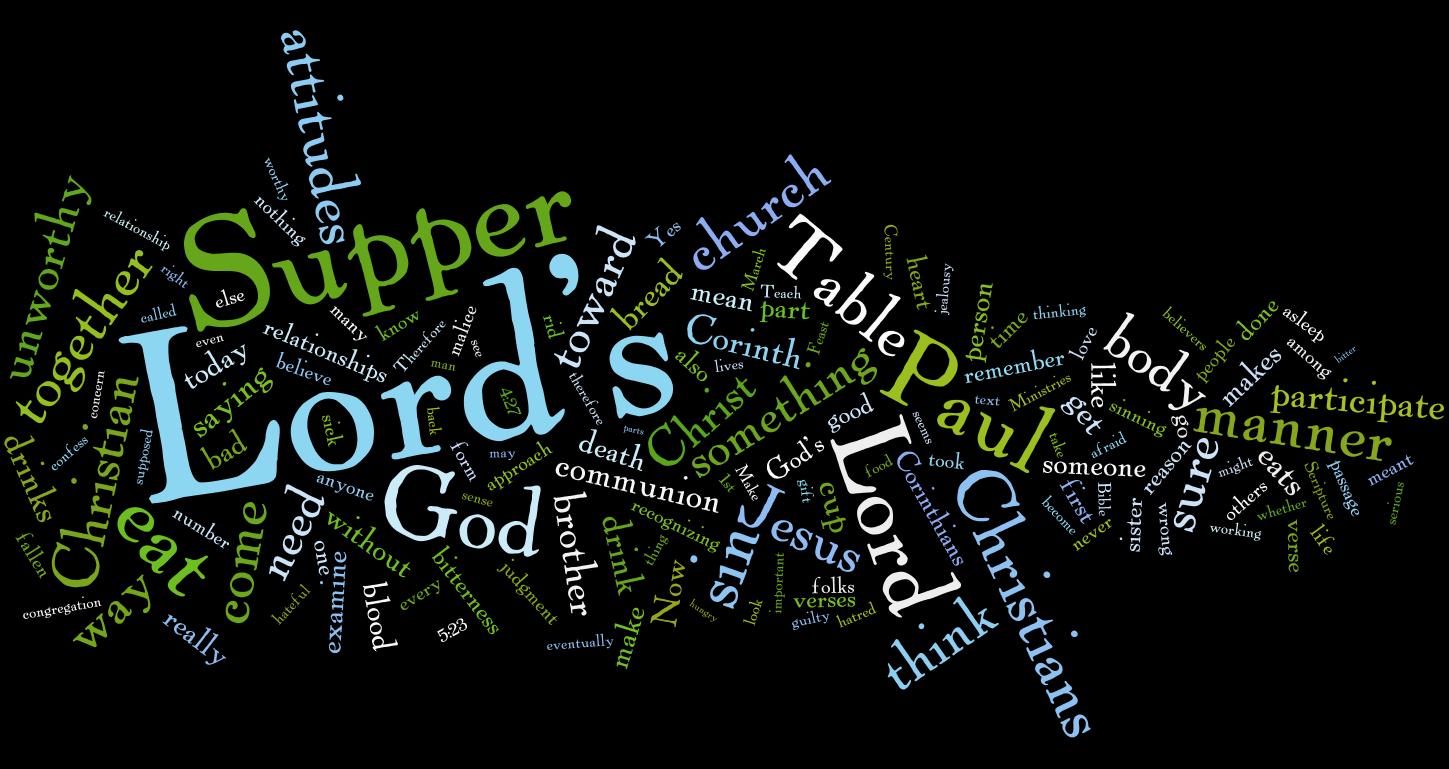| Running the Race | ||
| May 16, 2004 | Sermon by DRW | Passage Hebrews 12.1-3 |
1 Therefore, since we have so great a cloud of witnesses surrounding us, let us also lay aside (Romans 13.12, Ephesians 4.17-32) every encumbrance and the sin which so easily entangles us, and let us run (1 Corinthians 9.24-27) with endurance the race that is set before us,
2 fixing our eyes on Jesus, the author and perfecter of our faith, who for the joy set before Him endured the cross, despising the shame, and has sat down at the right hand of the throne of God.
3 For consider Him who has endured such hostility by sinners against Himself, so that you will not grow weary and lose heart (Galatians 6.9).
Introduction
I use to be a runner. Not many people believe that. I have slowed down some but I use to be fast. I can reflect back on my senior year in high school and a few years after that and recall many races won. I could do the 100 meter in just over 10 seconds. The 200 meter in just over 22 seconds. The 800 meter in 1 minute 50 seconds. My mile was pretty slow, just under 6 minutes. My three mile run was in the low 16 minutes. I only ran one 10k and that was pacing a man in a wheelchair. And I personally think Nancy is crazy. My most memorable race was the 200 meters.
Each year we went to an invitational and every year I cam in second to the same guy. This was the fourth time we had done this invitational (through the church I attended). This year I knew I was going to win. There was nothing that could stop me. I looked for the guy that beat me every year and felt sorry for him. I had my church in the stands cheering me on, my coach was giving me final words of comfort and strategy. The starter told us all to get in the blocks. We set ourselves, he raised the gun, he fired and we ran like the wind. Going around the curve, I was in the lead. I knew I had him. Fifty yards to go and the victory was mine. A thought crossed my mind. Despite my church and my coach’s encouragement, I listened to this voice in my head. In one split second I found myself doing what no runner should ever do. The voice in my head told me that I couldn’t win the race. The voice told me that I would never beat this guy. The voice told me to look back because the guy was getting ready to pass me. I listened, I looked, I lost.
It is my desire that this look into my past will help us in our present and future walk in Christ. Let us pray.
Father,
We ask that Your Holy Spirit show us the truth contained in Your Word. Allow us to see what Your Word has for us. We seek Your presence in this service and Your Holy Spirit to be actively teaching us as we look into Your Word, please look into our hearts. Help us to see what You created us for and how we can live that life that You have created for us to live.
In Jesus name, amen.
If you haven’t done so as of yet, turn in your Bible to Hebrews 12. We will be looking at verses one through three. I would like to discuss and present for you today a look at our Christian walk as seen in the eyes of a runner.
The first thing we notice in this passage is that there is a crowd surrounding us, cheering us on, who have lived their lives as an example for us. This crowd is comprised of those people in Hebrews 11 and all who have lived their lives for Christ.
A. The Crowd (1)
Let’s read that verse again:
1 Therefore, since we have so great a cloud of witnesses surrounding us, let us also lay aside (Romans 13.12, Ephesians 4.17-32) every encumbrance and the sin which so easily entangles us, and let us run (1 Corinthians 9.24-27) with endurance the race that is set before us,
1. The Saints Before
This passage provides us with a reminder that there are those in Heaven who are looking at our every move, seeing what God will do in and through us. Peter reminds us that the angels long to see what is going to happen to God’s people (FIND REFERENCE). With this in mind, we need to live a life that brings Him glory, living a life of purpose (1 Peter 2.21).
a. Old Testament
b. New Testament
c. Post New Testament
2. Brothers and Sisters
We should also see that those who cheer us on are our fellow brothers and sisters today, who are alive and sit beside us on a day-to-day or week-by-week basis. Our Christian friends are looking to us to be an example of one who runs the race well, just as we are looking to them for an example of the same.
a. Christian friends
b. Our Church
One of the biggest opportunities our church offers for encouragement to run the race well is our Friday Night Fellowship for the younger groups and CYA (CHAT) for the collegians and up. It can also be evidenced in our activities as each of us lead a life to glorify God. I see the forum at efccerritos.com being used, for the most part, for this purpose. People are posting questions, doubts, concerns, and are asking for help. For the most part, many of us are seeking to bring biblical advice into these discussions and this is what will help each of us press on in the race that God has set before us.
c. CHAT or FNF
3. Satan
There is another in the crowd. Not being the best cheerleader. He is Satan. He provides us with doubts, fears, he places people in our paths that will give us the wrong example, and he seeks to keep us from running the race that has been set before us.
If you remember the voice that came into my head when I was running that told me that I couldn’t beat the guy I was running against, that is what Satan does for us. His entire purpose is to keep us from the purpose that God has for us. Most of the time, as we are running, he places doubts and fears into our minds. He tempts us to doubt God’s goodness and promises or to live in fear through believing a lie. A good acronym for fear is Falsehood Existing As Reality. He places people in our lives that will lead us astray. He places temptations in our lives to cause us to stumble [REFERENCE STUMBLE FROM ISAIAH 40 FROM LAST WEEK AS THIS PART OF THE VERSE COMES UP IN THE DESCRIPTION OF THE RUNNER].
When we believe his lies, when we follow his examples, when we fall into temptation and sin, we lose. His desire is for us to believe his lies. Second Corinthians 4.3-4 tells us that Satan wants to blind our eyes from the truth because that is how he holds us captive. When this is done, 2 Timothy 2.24-26 tells us, Satan has us trapped. The only way to be freed, according to Jesus and Paul, is through the truth that is found in God’s Word not in the wisdom of this world (2 Corinthians 4.1-4; 2 Timothy 2.24-26).
Allow me to is illustrate this with two balls. As you can see, I can palm both of these balls but it is easier by far to palm the one with less air in it. I can control this ball with the greatest of ease. It is harder for me to grip the ball filled with air, and harder, therefore, to control it.
Satan cannot indwell us (possess us) for the Spirit of God does. When Satan tries to control Christians, he does so through what is called oppression. He places pressures in our life that make us think it is coming from God or from ourselves. An example of this is when David took a census in 1 Chronicles 21.1-8. It says that Satan moved David to take a census of the military men which was against God’s express will. He wanted David to rely on Him not on his army. When David spoke to Joab to number the troops, he didn’t say that Satan told him to do it. He told Joab that he made a decision to count the army. When this happened, God was displeased (7) and David confessed that he had sinned. Although David knew the truth he didn’t live it out, because of this, David sinned.
Back to the two balls. Satan can only get a grip in our lives as we are deflated. Let us compare the air in the ball to the Holy Spirit, who is called the Spirit of Truth. The more we allow the Holy Spirit to work in our lives (pump up the Infusion ball), the less Satan can grip our lives. The more we have the Word of God (continue to pump the ball) in our lives, the more we can resist Satan, the more he loses grip in our lives.
That is enough of a description of the crowd, let’s look at the course that we are called to run.
B. The Course (1-3)
Let’s read those verses again:
1 Therefore, since we have so great a cloud of witnesses surrounding us, let us also lay aside (Romans 13.12, Ephesians 4.17-32) every encumbrance and the sin which so easily entangles us, and let us run (1 Corinthians 9.24-27) with endurance the race that is set before us,
2 fixing our eyes on Jesus, the author and perfecter of our faith, who for the joy set before Him endured the cross, despising the shame, and has sat down at the right hand of the throne of God.
3 For consider Him who has endured such hostility by sinners against Himself, so that you will not grow weary and lose heart (Galatians 6.9).
One of the first things we notice is that a course has been created for us to run. It is our duty to understand that course to the best of our ability. I remember running cross country in High School at Pierce College, in the San Fernando Valley. This particular meet was the preliminaries to the finals. If we won this race, or came in second or third, we would have gone to the CIF finals. It was an important race. I recall it being a hot day with a lot of smog. The job of each runner is to walk the course to familiarize ourselves with the turns, the hills, and the finish line. Remember, it was hot and smoggy. Most of the team from my school, Narbonne, walked the hilly part of the course. It was hot so we looked for shade to sit in. We said we would look at the rest of the course after we rested. Well, we never did. We didn’t know where the finish line was nor what the course looked like before it. In order for us to qualify, I had to finish fifth overall. That was it. My pattern for running was to run in the middle of the pack until the last half-mile of the run and then do my 1 minute 50 second half-mile sprint. I was getting ready to do just that. I said that I would begin my sprint when I turned the next corner. The corner came, I sprinted around the corner passing people on the way. I moved up from thirtieth to seventeenth. I knew as soon as I turned the corner that I could easily finish in the top five. I saw the entire crowd in front of me, within yards. I rounded the corner, and there was the finish line. I finished somewhere around tenth. We lost the opportunity to go to CIF finals because I didn’t know how the course finished.
If there is a course created for us to run, we need to know what the course is like, how to run it, and where it ends. This will enable us to run the race with endurance. Our course was created by Jesus Christ. The great thing about Christianity is that
1. Jesus Christ
not only created the race but He has run it to show us that we can complete it as well. He designed it and ran it to show us it could be done. He tells us how to run it well, this is what the Bible shows us. He also shows us through living examples (remember the crowd?) of what needs to be done and that it can be done. We can run the race as we focus on Him and follow the godly examples He has set before us. Remember my 200 meter race? I lost it because I looked back, taking my focus off of the finish line. We do the same as we forget to look to the author and finisher of our race. Remember Peter as he sunk in the water when he took his eyes of Jesus.
a. He ran the race
b. He designed the course
c. He tells us (Bible) and shows us (saints) how to run it
God knows that we are going to stumble, lose our way, and want to give up in the race that He has set before us to run. This is one of the reasons He has provided us with the Holy Spirit.
2. The Holy Spirit
The Holy Spirit guides us during the race, He indwells us to keep us focused on what is important. John 14 and 16 tell us that He is our guide and comfort that directs our focus on Jesus. He gives us the strength to finish the race set before us.
a. He guides us through the race
b. He gives us comfort as we compete in the race
The last part of this passage tells us a little about us.
C. The Cruiser (1-2)
The first thing we need to notice is that those who are being addressed are Christians. If we are not Christians, this is meaningless to us because we won’t see a need to do these things. A Christian is anyone who believes that Jesus Christ is God, that their sin has separated them from God, that each of us has sinned, that Christ’s death was the payment for the debt sin made, and then personally accepting this for ourselves. If you haven’t done this, please talk with Mike or myself today.
1. Christians
a. Only those who believe can run this race
b. Believe that Jesus is God
c. Accept His death for your sins
d.
In order for us to run this race effectively, secondly, we must be in condition to complete it.
2. Conditioning
We need to prepare for the race. This involves quite a few things as a runner. To begin with, each runner needs to be loose continually. That is, we need to be in the habit of stretching out quite often. We also need to train for the race on a continual basis. We cannot just go and run a 100 meter or a three-mile race and expect to win without practice. We also need to have a strategy to overcome the difficulties during the race itself. When running in a few sprints in a day, there needs to be a strategy to compete successfully in each race. When running a distance race, a strategy is required too.
a. Preparation for the race
b. Stretch
I see stretching as analogous to personal devotions, prayer and Bible study. If we are not continually stretching ourselves out we will become stiff and unable to run. The moment we stop our personal reading of Scripture and prayer time, we become unable to compete in the race that God has set for us to run. We will be unable to live the life He created us to live.
c. Train
I see training as analogous to doing what we have learned through personal and corporate Bible study and prayer. That is, we act what we have learned. This is done privately and corporately. We do, we run, what we have learned. We see this as happening through FNF and CHAT, through talking with others about what we have learned, by living what we have learned.
d. Strategy
I see the strategy as devising a plan to live out the life, to run the race set before me. The strategy for running a three-mile race was to run with the pack and then sprint at the end. The strategy I had for running a few sprints in a day was to run, hydrate, eat bananas, stretch, rest, and then run. It may not be the same thing Becky does, but it worked for me. When need to understand that Satan has a strategy to make us fall, we need to have a strategy to run successfully. This strategy should involve fellowship, church, worship, Bible study, prayer, and ministry to the church and to those outside the church through evangelism and the like.
As you can see, this is a tough thing to do and requires a level of commitment that runs deep.
3. Commitment
This commitment needs to be deep because it requires are all. It is like when Christ was heading to Jerusalem where He would be crucified. We are told in Luke 9 that He set His face like stone. He would not be moved from completing His task. We are told the same thing by Peter in 2 Peter 1. We are to be committed to this race. This is seen in our passage in verse 1. We need to lay aside everything that will keep us from running well. There are few, if any, runners who are overweight. Most runners refuse to carry anything with them because they know it will slow them down. What is weighting you down, keeping you from running well? Whatever it is, we need to get rid of it. Our journey is a long, hard one that requires we be persistent and committed. I refer you back to last week’s message that explained how we can gain strength to finish well.
a. Hard
b. Long
c. Journey
We also see in this passage that we are to actually run this race and complete it.
4. Completion of the Course
When running a distance race we need help to complete it. I have never run a marathon and don’t plan to run one either. But, from my understanding, all along the course there are markers that letting you know how far you have gone. There are also markers with people there providing you with needed refreshment. There are orange markers, banana markers, first aide markers, water markers, and so on. Each one of these markers are intended to replenish what your body is losing during the run. We need to be in close fellowship with brothers and sisters that we are being replenished by them as we are running. Our problem is that we place people who are not believers at these markers. We are seeking to be refreshed through people who don’t have the ultimate Refresher living in them. We can never be fully refreshed by people who are not Christians nor by Christians who are not living for Christ. Who is it that you are seeking to refresh you?
a. Markers
b. Crowds (who you are hanging with)
Finally, in each race there is a finish line.
5. Commencement (or conclusion)
The race that we are in has many winners. A winner is someone who crosses the finish line. Ask Nancy if she felt like a lose when she ran the LA Marathon. She didn’t finish first. What caused her to be a winner was that she finished. That is how we need to see this life. The goal is to finish. Are you running in such a way as to finish well?
a. Crown of life
I want to commend you to do the following:
1. Focus your eyes on Jesus.
2. Devote yourself to prayer and Bible study as a personal and corporate habit.
3. Have Christians who are following Christ as part of your support group.
4. When you find yourself starting to stumble, refer to number 1.
©2012 Teach for God Ministries. Used by Permission.
Permissions: You are permitted and encouraged to reproduce and distribute this material in any format provided that you do not alter the wording in any way and do not charge a fee beyond the cost of reproduction. For web posting, a link to this document on our website is preferred. Any exceptions to the above must be approved by Teach for God Ministries.
Please include the following statement on any distributed copy: By David R Williamson. ©2012 Teach for God Ministries. Website: www.teach4god.com









